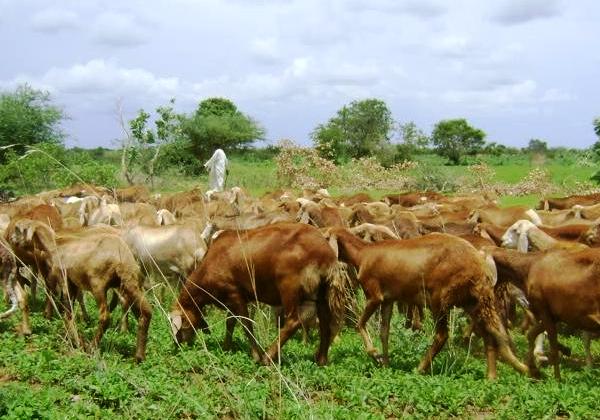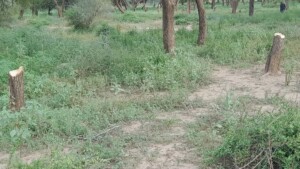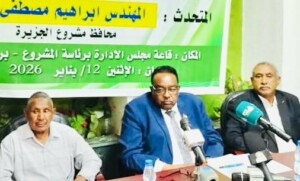Agricultural crops in Sudan threatened by pests, prices, and herders
Groundnut and sesame crop harvests in South Kordofan are under “major threat,” said a minister of the state government in an interview with Radio Dabanga. In Central Darfur, livestock is being released early on agricultural land without farmers’ consent.
 Sheep grazing on agricultural land in El Gedaref (File photo)
Sheep grazing on agricultural land in El Gedaref (File photo)
Groundnut and sesame crop harvests in South Kordofan are under “major threat” said a minister of the state government in an interview with Radio Dabanga. In Central Darfur, livestock is being released early on agricultural land without farmers’ consent.
The director of the Ministry of Production and Economic Resources of South Kordofan, Ibrahim Omar Hamouda, said that the current agricultural season has had various issues, including “huge amounts” of starlings.
He said that El Goz, Habila, Rashad, El Abbasiya and El Tadamon are the most affected localities. Pesticide spraying initiatives have begun in Habila and the area of Abu Jubeiha in Rashad. The task is very difficult and high risk in Abu Jubeiha, which is known for its dense forests.
Earlier this month, farmer Bakri Madi said that initiatives to limit the number of pests in areas including Habila “have not yet seen the light of day,” despite the Plant Protection Department at the South Kordofan Ministry of Agriculture being notified of the danger to crops on October 4.
Hamouda explained that there are also a number of other issues at play, including the low sale value of crops and a lack of workers. This could push impoverished farmers to find other sources of income and ultimately shrink the amount of land being farmed next year, he said.
Last year, farmers were forced to take loans from the Agricultural Bank to prepare for the winter season, as the bank's financing of production inputs stopped five years ago, and they did not receive any other state support in the meantime.
The return of herders from the north after the rainy season forms another threat to a good harvest as they often graze their livestock on farms. Hamouda stressed that no reports about this have been recorded so far.
Livestock grazing
Farmers in Bindisi, Central Darfur, said that the early release of livestock on farms is destroying crops in the northwest of the locality. Community leader Sheikh Ishag told Radio Dabanga that herders “have never begun grazing their cattle on farms as early as October.”
The shepherds move their livestock onto the farms at gunpoint. Complaints have been lodged at Bindisi police station, but the police were unable to pursue the perpetrators due to the lack of police personnel and vehicles, Sheikh Ishag said.
He explained that there are 30 police personnel and one police vehicle in Bindisi, calling on the state government to expand the force so that it is able to protect the agricultural season.
Disputes between herders and farmers occur regularly in Darfur at this time of year. As the rainy season ends in September and the herders need fresh pastures, they let their camels and cattle graze on farmlands that have not yet been harvested. Each year, farmers complain about livestock destroying their crops.
Risk of collapse
Farmers in Sudan are facing great challenges that may lead to the failure of the current agricultural season, speakers at the weekly discussion platform of the Ministry of Information warned on August 11.
Journalist Ayoub El Sileik, specialised in agricultural affairs, told Radio Dabanga in June that “the yields in the previous seasons were thanks to the farmers and their diligence only.” He also warned of a collapse of farming in Sudan, positing that “if agriculture collapses, Sudan will collapse.”











 and then
and then